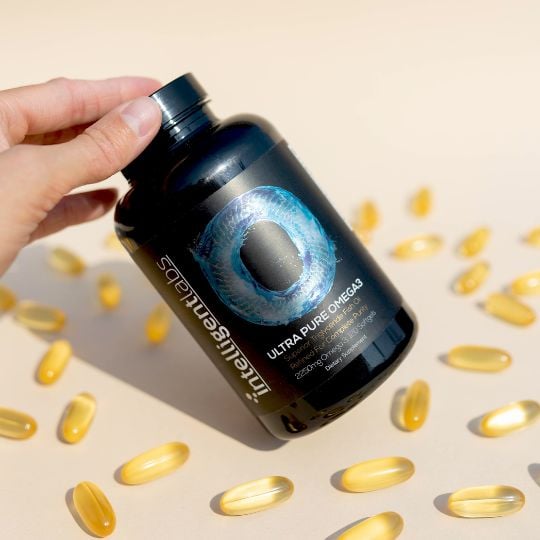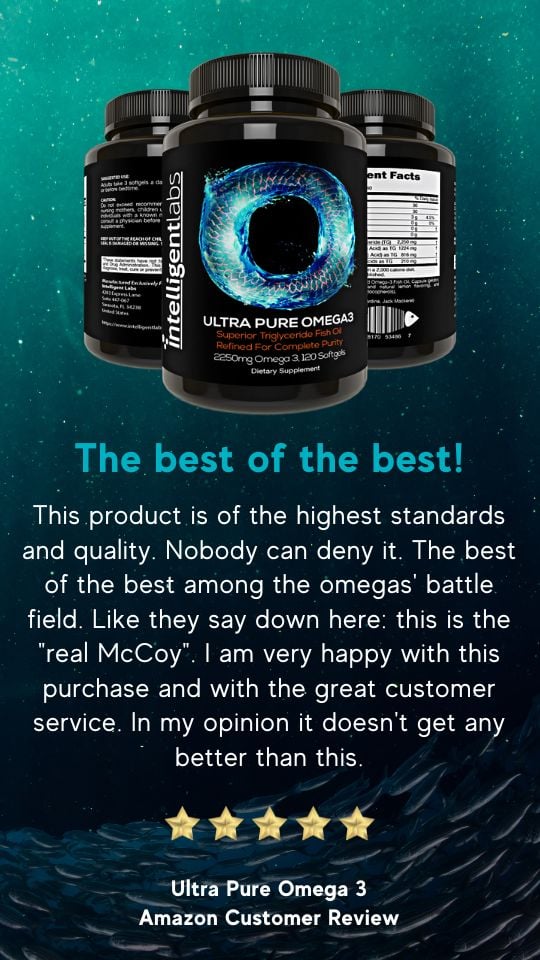¿Pueden ayudar los ácidos grasos omega-3 con la artritis?
¿Sufres de dolor articular? No estás solo. Millones de personas en todo el mundo padecen artritis. Es una enfermedad debilitante sin cura a la vista. Sin embargo, una dieta y un estilo de vida saludables pueden ayudar a controlar los síntomas. La pregunta ahora es: ¿pueden los ácidos grasos omega-3 también ayudar con la artritis? ¡Descubrámoslo a continuación!
¿Qué es el omega-3?
Omega-3 se refiere a un grupo de ácidos grasos poliinsaturados que contribuyen a la salud del corazón, la salud cerebral y mental, la salud inmunológica, la salud ocular, la fertilidad y más. 1.
Probablemente hayas oído hablar de los más populares, el EPA y el DHA, pero en realidad existen 11 omega-3 en la naturaleza. Hasta ahora, solo cuatro se han considerado vitales para la salud y el funcionamiento humano. Estos son:
- DHA (ácido docosahexaenoico)
- EPA (ácido eicosapentaenoico)
- ALA (ácido alfa-linolénico)
- DPA (ácido docosapentaenoico)
El DHA, el EPA y el DPA se consideran omega-3 marinos. Son abundantes en pescados grasos como el salmón, las sardinas, la caballa, el atún, las anchoas y otros mariscos.
Por supuesto, otra excelente fuente de omega-3 marinos es nuestro suplemento Intelligent Labs Ultra Pure Omega 3.
Cada porción contiene 1224 mg de EPA, 816 mg de DHA y 210 mg de otros ácidos grasos omega-3 marinos. ¡Al sumar todos estos nutrientes, cada porción aporta la impresionante cantidad de 2250 mg de ácidos grasos omega-3!
El ALA, por otro lado, es un omega-3 de origen vegetal, lo que lo convierte en una opción vegana. El ALA se encuentra en diversas plantas, frutos secos y semillas. El cuerpo convierte parte del ALA en EPA y DHA, pero este proceso no es nada eficiente. De hecho, la conversión de ALA a EPA es solo de alrededor del 5-10% y de alrededor del 2-5% para DHA (22).
Este artículo se centrará en los ácidos grasos omega-3 marinos (específicamente EPA y DHA) y si pueden ayudar con la artritis.
Artículo relacionado: Conozca los diferentes tipos de ácidos grasos omega-3
¿Cuáles son los tipos más comunes de artritis y pueden ayudar los omega-3?
La artritis no es una sola enfermedad. Es un conjunto de más de 100 afecciones con una causa común: la inflamación crónica o hinchazón de las articulaciones. Las tres formas más comunes de artritis son la osteoartritis (OA), la artritis reumatoide (AR) y la gota 3.
1 – Osteoartritis
Conocida como artritis por desgaste, la osteoartritis es, con diferencia, la forma más común de artritis. En 1990, 247 millones de personas padecían artrosis. En 2019, esta cifra se disparó a 527 millones. Lamentablemente, debido a la prevalencia de estilos de vida poco saludables, se prevé que esta cifra siga aumentando 4.
La artrosis se produce cuando el cartílago que protege las articulaciones se degrada, principalmente debido al envejecimiento o a traumatismos, lo que provoca la fricción entre los extremos óseos. Esto causa dolor, rigidez e hinchazón en las articulaciones afectadas. Las partes del cuerpo más comúnmente afectadas por la artrosis son las manos, las caderas y las rodillas. La triste realidad es que, a medida que envejecemos, mayor es la probabilidad de desarrollar esta afección 5.
¿Puede el aceite de pescado omega-3 ayudar con la osteoartritis?
Desafortunadamente, la respuesta puede ser no.
La revisión narrativa de Cordingley de 2022 mostró que, si bien los estudios iniciales en animales fueron muy prometedores, los estudios reales en humanos han sido decepcionantes. Varios productos omega-3, como el aceite de pescado, el aceite de krill, el aceite de hígado de bacalao y el extracto de mejillón, no cumplieron con las expectativas. Se necesita más investigación para determinar si los ácidos grasos omega-3 pueden ayudar a retrasar el deterioro del cartílago y reducir la inflamación en pacientes con artrosis 6.
Una revisión sistemática anterior también llegó a la misma conclusión. Los suplementos de aceite de pescado aparentemente no tuvieron efectos significativos en pacientes con artrosis. Sin embargo, curiosamente, sí tuvieron resultados notables en pacientes con artritis reumatoide (AR) 7!
Si bien el aceite de pescado puede no ser beneficioso para los pacientes con artrosis, la buena noticia es que existen otros suplementos totalmente naturales para el alivio de la artritis. Por ejemplo, la glucosamina y la boswellia pueden ayudar a controlar el dolor y la inflamación de la artrosis e incluso a preservar la estructura articular8 9.
Nuestro complejo de glucosamina de Intelligent Labs está específicamente formulado para la salud articular. Además de la glucosamina, añadimos otros siete ingredientes conocidos por su acción antiinflamatoria y antiartrítica: condroitina, boswellia, cúrcuma, quercetina, metionina, MSM y bromelina.
Check out the blog posts below for more information on how our Glucosamine Complex can help with osteoarthritis management:
#2 – Rheumatoid arthritis
Rheumatoid arthritis isn’t just an ordinary inflammatory disease. It’s also an autoimmune disease, meaning the immune system attacks healthy cells.
This form of arthritis is systemic (as opposed to localized like OA and gout) and affects more than just the joints. Tissue and organs that surround the joints may also be affected. It’s not uncommon for RA to cause widespread inflammation in the eyes, blood vessels, heart, and lungs (1010).
Up to 1% of the global population, or up to 80 million people, is said to have this condition (1111).
Can omega-3 fish oil help with rheumatoid arthritis?
The answer is yes, omega-3 may help RA patients!
A 2017 review of 20 clinical trials yielded promising results. In these trials, the average intake duration of fish oil supplements ranged from 12 to 52 weeks. Even at the shortest duration (12 weeks), RA patients showed significant improvement in their symptoms. Moreover, no adverse side effects were reported, even at high doses, suggesting fish oil safety (12)12.
Marine omega-3 fatty acids significantly improve RA symptoms, especially when the EPA:DHA ratio exceeds 1.5 (7).
Fish oil supplementation isn’t the only helpful way to reduce RA symptoms. Regular consumption of fish rich in omega-3 is also highly recommended. After all, you get more than just omega-3 from whole fish; there are also other nutrients to benefit from! Eating more servings of fish weekly leads to lower RA disease activity (1313).
#3 – Gout
Gout is a form of arthritis that typically affects a single joint at a time, though it’s not unheard of to have multiple joints erupting in pain all at once!
Gout occurs when there’s too much uric acid in the body. The uric acid crystals build up in joints, causing excruciating flare-ups. Some have described gout pain as akin to sticking a red hot poker in the affected joint (14)14!
According to Statista, around 34.5 million people suffered from gout in 2017. This number may increase to 38.5 million in 2026 (1515).
Can omega-3 fatty acids help with gout?
While omega-3 has many scientifically-proven health benefits, its effects on gout aren’t well-studied yet. Only a few studies have been published so far, but the results don’t seem to favor omega-3 fish oil.
For instance, a recently published randomized controlled trial showed that taking fish oil for 6 months didn’t have any effect on uric acid levels or gout flares (1616).
Also, eating omega-3 rich fish may be better at lowering gout attacks compared to omega-3 supplementation. Quite surprising considering the purine content in fish, but researchers did the math and made adjustments for anti-gout medication (1717).
While a small study did report that high omega-3 levels may be associated with fewer gout attacks, it had a few drawbacks. For instance, the researchers did not collect data on dietary risk factors and patient lifestyles (1818). Unfortunately, these are key pieces of information that can seriously affect the study’s outcome.
Conclusion
To sum up this article, omega-3 fatty acids may indeed help with rheumatoid arthritis. Sadly, its effects on osteoarthritis and gout aren’t as clear-cut, but that doesn’t mean you shouldn’t eat omega-3-rich foods or supplements. Without a doubt, omega-3 is one of the most vital nutrients for human health and wellness. It’s important to ensure sufficient levels of omega-3 fatty acids whether you have arthritis or not!
References
- Omega-3 Fatty Acids, Fact Sheet for Health Professionals, from: https://ods.od.nih.gov/factsheets/Omega3FattyAcids-HealthProfessional/ ↩︎
- Davis BC, Kris-Etherton PM. Achieving optimal essential fatty acid status in vegetarians: current knowledge and practical implications. Am J Clin Nutr. 2003;78(3 Suppl):640S-646S. ↩︎
- ↩︎
- Arthritis Types from: https://www.cdc.gov/arthritis/types/index.html ↩︎
- Prevalence Trends of Site-Specific Osteoarthritis From 1990 to 2019: Findings From the Global Burden of Disease Study 2019, Huibin Long, Qiang Liu, Heyong Yin, Kai Wang, Naicheng Diao, Yuqing Zhang, Jianhao Lin, Ai Guo, Arthritis & Rheumatology, Volume 74, Issue 7 p. 1172-1183 ↩︎
- Overview-Osteoarthritis, taken from: https://www.nhs.uk/conditions/osteoarthritis/ ↩︎
- Cordingley DM, Cornish SM. Omega-3 Fatty Acids for the Management of Osteoarthritis: A Narrative Review. Nutrients. 2022; 14(16):3362. ↩︎
- Senftleber NK, Nielsen SM, Andersen JR, Bliddal H, Tarp S, Lauritzen L, Furst DE, Suarez-Almazor ME, Lyddiatt A, Christensen R. Marine Oil Supplements for Arthritis Pain: A Systematic Review and Meta-Analysis of Randomized Trials. Nutrients. 2017; 9(1):42. ↩︎
- Reginster JY, Deroisy R, Rovati LC, et al. Long-term effects of glucosamine sulphate on osteoarthritis progression: a randomised, placebo-controlled clinical trial. Lancet. 2001;357(9252):251-256. ↩︎
- Efficacy and tolerability of Boswellia serrata extract in treatment of osteoarthritis of knee – A randomized double blind placebo controlled trial, N. Kimmatkar, V. Thawani et al. Phytomedicine, Volume 10, Issue 1, 2003, Pages 3-7 ↩︎
- Complications -Rheumatoid arthritis, taken from: https://www.nhs.uk/conditions/rheumatoid-arthritis/complications/ ↩︎
- A Review of the Prevalence and Unmet Needs in the Management of Rheumatoid Arthritis in Africa and the Middle East, Hani Almoallim, Jamal Al Saleh et al. Rheumatol Ther. 2021 Mar; 8(1): 1–16. ↩︎
- Omega-3 Fatty Acids in Rheumatic Diseases A Critical Review, Akbar, Umair BS; Yang, Melissa BS; Kurian, Divya BS; Mohan, Chandra MD, PhD, JCR: Journal of Clinical Rheumatology 23(6):p 330-339, September 2017. ↩︎
- The relationship between fish consumption and disease activity in rheumatoid arthritis, Sara K. Tedeschi et al. Arthritis Care Res (Hoboken). 2018 Mar; 70(3): 327–332. ↩︎
- Gout, taken from Centers for Disease Control and Prevention, https://www.cdc.gov/arthritis/types/gout.html?CDC_AA_refVal=https%3A%2F%2Fwww.cdc.gov%2Farthritis%2Fbasics%2Fgout.html ↩︎
- Number of gout cases worldwide in 2017 and a forecast for 2026 (in millions), Published by John Elflein, Aug 15, 2019 ↩︎
- Stamp, L.K., Grainger, R., Frampton, C. et al. Effect of omega-three supplementation on serum urate and gout flares in people with gout; a pilot randomized trial. BMC Rheumatol 6, 31 (2022). ↩︎
- Effect of Dietary and Supplemental Omega-3 Polyunsaturated Fatty Acids on Risk of Recurrent Gout Flares, MaryAnn Zhang, MD, Yuqing Zhang et al. Arthritis Rheumatol. 2019 Sep; 71(9): 1580–1586. ↩︎









